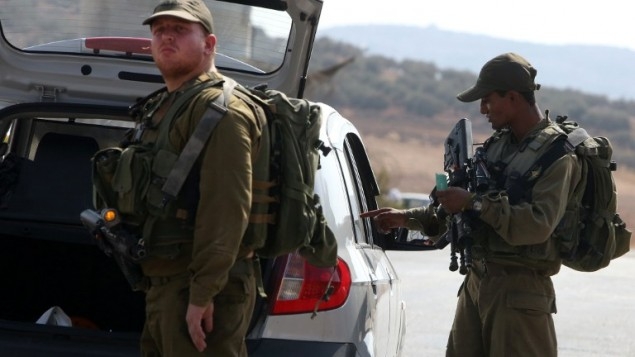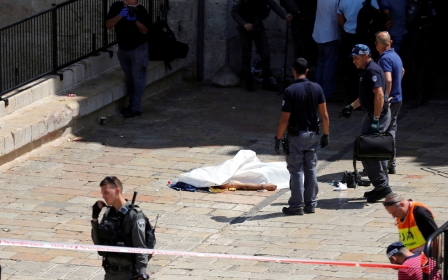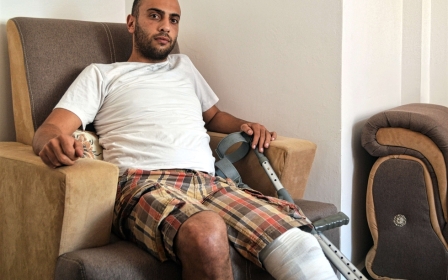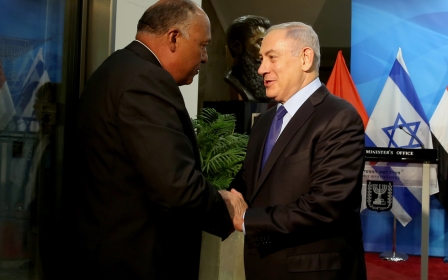Palestinian killed after alleged stabbing amid fresh West Bank violence

A Palestinian man was shot dead in the occupied West Bank on Saturday morning after allegedly stabbing and wounding an Israeli soldier at a checkpoint, the Israeli military said, marking a spike in violence on both sides in the last 24 hours, after a three-week pause in such violence.
An Israeli police spokesperson said an "assailant armed with a knife" stabbed an Israeli soldier during a "routine security check" before being shot dead in the West Bank city of Hebron, a flashpoint for recent violence.
"In response to the immediate threat, forces at the scene shot the assailant, resulting in his death."
The Palestinian health ministry named the man killed as 25-year-old Hatem al-Shaloudi, a resident of Tel Rumeida on the outskirts of Hebron.
The latest death brings the toll from the past 24 hours to five. On Friday, three Palestinians and one Jordanian were shot and killed by Israeli forces across the occupied West Bank and East Jerusalem.
Hanan Ashrawi, a senior Palestinian legislator, accused Israel of a "wilful policy of summary executions".
"Israel is flagrantly employing a systematic and wilful policy of summary executions against the Palestinian people; such provocative acts are in direct violation of international law and conventions," she wrote in a statement on Saturday.
"We call on the international community to engage rapidly and effectively and to hold Israel accountable with punitive measures before it is too late."
An Israeli military spokesperson told AFP that the latest attack was "another expression of the incitement [against Israel] on the Palestinian street and on social networks".
Since October, 228 Palestinians, 34 Israelis, two Americans, one Eritrean and a Sudanese national have been killed in ongoing violence, according to an AFP count.
Israeli forces say most of the Palestinians killed were carrying out, or attempting to carry out, knife, gun or car-ramming attacks. Others were shot dead during protests and clashes.
Israel has occupied the West Bank since capturing it in the 1967 Six Day War.
In the Gaza Strip on Friday, a Palestinian medical official said that Israeli troops at the border fence east of Gaza City shot and slightly wounded three Palestinian youths.
The uptick in violence brought to the fore the persistent tensions in the region, and came as UN chief Ban Ki-moon warned that the two-state solution was "further than ever" from becoming reality.
Previously there had not been an attack in three weeks.
International powers have criticised Israel's continued settlement expansion in the West Bank and east Jerusalem, with more than 500,000 Israelis now living in outposts that the international community considers illegal, as well as incitement to violence by Palestinian leaders.
"Despite warnings by the international community and the region, leaders on both sides have failed to take the difficult steps needed for peace," Ban said on Friday.
"Let me be absolutely clear: settlements are illegal under international law. The occupation, stifling and oppressive, must end," he said.
Ban also hailed former Israeli president Shimon Peres, the last of Israel's founding fathers, who suffered a major stroke this week.
The veteran Israeli leader won the Nobel Peace Prize in 1994 along with Yitzhak Rabin and Yasser Arafat for his role in negotiating the Oslo peace accords.
The United Nations has been struggling to find a way to re-start the Israeli-Palestinian peace process, which has stalled since a US-led diplomatic effort collapsed in April 2014.
New MEE newsletter: Jerusalem Dispatch
Sign up to get the latest insights and analysis on Israel-Palestine, alongside Turkey Unpacked and other MEE newsletters
Middle East Eye delivers independent and unrivalled coverage and analysis of the Middle East, North Africa and beyond. To learn more about republishing this content and the associated fees, please fill out this form. More about MEE can be found here.




